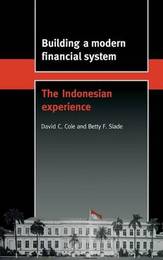
|
Building a Modern Financial System: The Indonesian Experience
Hardback
Main Details
| Title |
Building a Modern Financial System: The Indonesian Experience
|
| Authors and Contributors |
By (author) David C. Cole
|
|
By (author) Betty F. Slade
|
| Series | Trade and Development |
|---|
| Physical Properties |
| Format:Hardback | | Pages:408 | | Dimensions(mm): Height 229,Width 152 |
|
| Category/Genre | Development economics
Finance
Banking |
|---|
| ISBN/Barcode |
9780521570923
|
| Classifications | Dewey:332.109598 |
|---|
| Audience | | Professional & Vocational | |
|---|
| Illustrations |
60 Tables, unspecified
|
|
Publishing Details |
| Publisher |
Cambridge University Press
|
| Imprint |
Cambridge University Press
|
| Publication Date |
10 October 1996 |
| Publication Country |
United Kingdom
|
Description
Building A Modern Financial System provides penetrating insights into the recent upheavals in Indonesia, and explains the kinds of policies that can lead to the development of a modern financial system in a large, relatively underdeveloped country. The study covers all facets of the financial system, emphasising the role of the monetary authorities, the transition from government-dominated to a predominantly private banking system, and the recent rapid expansion of the capital market. Indonesia is a particularly interesting case because its economy and financial system was in shambles in the mid-1960s owing to political adventurism and economic mismanagement. Until recently sensible economic policies and growth-promoting reforms provided a sound financial system and a balanced expansion of agriculture and industry. However since the mid-1990's the stability of the Indonesian system has once again been called into question.
Reviews'This fine book is already a standard reference work on Indonesian financial development. It provides historical scope, both comprehensive coverage and institutional depth of detail, and insightful, very balanced policy analysis and assessment of the process over the past thirty years ... In reading this book one gains a deepened appreciation of all that is needed to create a strong prudential system: the political will; the right laws and their strong enforcement; effective accounting, auditing, supervisory and inspection systems; adequate disclosure and transparency; and sufficient numbers of well-trained specialists to carry out these tasks. Moreover, once problems are discovered there has to be the political and institutional will to correct them rather than paper them over ... In virtually all these respects Indonesia remains prudentially weak ... This book is not only a case study of Indonesia, it is a model of the sort of studies we need for national experiences of financial development and, given Indonesia's earlier statist ideology, is of particular policy relevance for economies transiting from planned to market economies.' Professor Hugh Patrick, Asian-Pacific Economic Literature
|